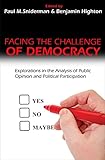Facing the Challenge of Democracy : Explorations in the Analysis of Public Opinion and Political Participation / ed. by Benjamin Highton, Paul M. Sniderman.
Material type: TextPublisher: Princeton, NJ : Princeton University Press, [2011]Copyright date: ©2012Edition: Course BookDescription: 1 online resource (416 p.) : 28 line illus. 53 tablesContent type:
TextPublisher: Princeton, NJ : Princeton University Press, [2011]Copyright date: ©2012Edition: Course BookDescription: 1 online resource (416 p.) : 28 line illus. 53 tablesContent type: - 9780691151113
- 9781400840304
- POLITICAL SCIENCE -- Political Freedom & -- Security -- Civil Rights
- POLITICAL SCIENCE -- Political Freedom & -- Security -- Human Rights
- POLITICAL SCIENCE -- Political Process -- Political Parties
- Political participation -- United States
- Public opinion -- United States
- United States -- Politics and government -- 1989-
- POLITICAL SCIENCE / Political Process / Campaigns & Elections
- 1950s sociology
- 2008 National Annenberg Election Study
- American party system
- American politics
- American public opinion
- Election Day registration
- George W. Bush
- John McCain
- NAES
- Pure Independents
- Sarah Palin
- U.S. elections
- U.S. senators
- U.SЃhina relations
- Who Votes?
- activism
- alternative modeling strategies
- campaign strategy
- candidate-centered campaigns
- candidate-centered voting
- challenger partisans
- citizen competence
- citizen preferences
- citizens
- civic engagement
- closing dates
- cognition
- conflict of interest
- congressional elections
- conservative identification
- cosmopolitan orientation
- cosmopolitanism
- democracy
- democratic representation
- election outcomes
- electoral preferences
- elite-driven theory
- foreign policy
- ideological conservatives
- ideological consistency
- ideological contradiction
- ideological polarization
- ideological shift
- incumbent partisans
- independent voter
- independents
- institution-free approach
- institutions
- issue preferences
- job approval ratings
- liberal policy preferences
- mass belief systems
- mass opinion
- modern political campaigns
- nonvoters
- ordinary citizens
- participatory bias
- partisan bias
- partisan differences
- partisan differential
- partisan polarization
- party identification
- party polarization
- party-centered voting
- polarization
- policy preference heuristics
- policy preferences
- political activism
- political behavior
- political candidates
- political consistency
- political participation
- political participations
- political parties
- political preferences
- political right
- political scientists
- politically coherent choices
- politics
- public opinion surveys
- public opinion
- public
- purposive belief systems
- purposive reasoning
- registration deadlines
- roll-call behavior
- social spaces
- universal turnout
- vote choice
- vote misreporting
- vote models
- vote preference
- vote validation study
- voter turnout
- voters
- votes
- 323.0420973 23
- JK1764
- online - DeGruyter
- Issued also in print.
| Item type | Current library | Call number | URL | Status | Notes | Barcode | |
|---|---|---|---|---|---|---|---|
 eBook
eBook
|
Biblioteca "Angelicum" Pont. Univ. S.Tommaso d'Aquino Nuvola online | online - DeGruyter (Browse shelf(Opens below)) | Online access | Not for loan (Accesso limitato) | Accesso per gli utenti autorizzati / Access for authorized users | (dgr)9781400840304 |
Frontmatter -- Contents -- Contributors -- Introduction: Facing the Challenge of Democracy -- Part I: The Political Logic of Preference Consistency -- I. How Do Political Scientists Know What Citizens Want? -- II. Purposive Mass Belief Systems concerning Foreign Policy -- III. Cosmopolitanism -- IV. Running to the Right -- V. Pathways to Conservative Identification -- Part II. Polarization and the Party System -- VI. Partisan Differences in Job Approval Ratings of George W. Bush and U.S. Senators in the States -- VII. Political Participation, Polarization, and Public Opinion -- VIII. Political Parties in the Capital Economy of Modern Campaigns -- IX. Candidates and Parties in Congressional Elections -- X. The Myth of the Independent Voter Revisited -- Part III. Participation and Representation -- XI. Who Really Votes? -- XII. Who Governs if Everyone Votes? -- XIII. The Effects of Registration Laws on Voter Turnout -- XIV. Issue Preferences, Civic Engagement, and the Transformation of American Politics -- References -- Index
restricted access online access with authorization star
http://purl.org/coar/access_right/c_16ec
Citizens are political simpletons--that is only a modest exaggeration of a common characterization of voters. Certainly, there is no shortage of evidence of citizens' limited political knowledge, even about matters of the highest importance, along with inconsistencies in their thinking, some glaring by any standard. But this picture of citizens all too often approaches caricature. Paul Sniderman and Benjamin Highton bring together leading political scientists who offer new insights into the political thinking of the public, the causes of party polarization, the motivations for political participation, and the paradoxical relationship between turnout and democratic representation. These studies propel a foundational argument about democracy. Voters can only do as well as the alternatives on offer. These alternatives are constrained by third players, in particular activists, interest groups, and financial contributors. The result: voters often appear to be shortsighted, extreme, and inconsistent because the alternatives they must choose between are shortsighted, extreme, and inconsistent. Facing the Challenge of Democracy features contributions by John Aldrich, Stephen Ansolabehere, Edward Carmines, Jack Citrin, Susanna Dilliplane, Christopher Ellis, Michael Ensley, Melanie Freeze, Donald Green, Eitan Hersh, Simon Jackman, Gary Jacobson, Matthew Knee, Jonathan Krasno, Arthur Lupia, David Magleby, Eric McGhee, Diana Mutz, Candice Nelson, Benjamin Page, Kathryn Pearson, Eric Schickler, John Sides, James Stimson, Lynn Vavreck, Michael Wagner, Mark Westlye, and Tao Xie.
Issued also in print.
Mode of access: Internet via World Wide Web.
In English.
Description based on online resource; title from PDF title page (publisher's Web site, viewed 29. Jul 2021)


